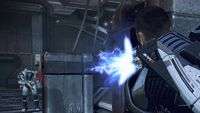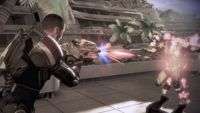Mass Effect 3 – Review
by Stu
|
 It was with both excitement and trepidation in equal measure that had me gripped as I launched Mass Effect 3 for the first time. I couldn’t wait to step into that familiar armour with the iconic N7 logo emblazoned across the chest, stride down the corridors of the Normandy collecting accolades from my crew, but most of all I couldn’t wait to see how my decisions from two prior games and this third one would affect the galaxy. As the final game in the trilogy it’d been made quite clear that a reckoning was coming, and I had to wonder: Could my Shepard measure up to the giant metallic space shrimp threat of the Reapers?
It was with both excitement and trepidation in equal measure that had me gripped as I launched Mass Effect 3 for the first time. I couldn’t wait to step into that familiar armour with the iconic N7 logo emblazoned across the chest, stride down the corridors of the Normandy collecting accolades from my crew, but most of all I couldn’t wait to see how my decisions from two prior games and this third one would affect the galaxy. As the final game in the trilogy it’d been made quite clear that a reckoning was coming, and I had to wonder: Could my Shepard measure up to the giant metallic space shrimp threat of the Reapers?
The game loaded and I was presented with a burning planet; Earth. The quiet instrumental music sat in the background adding to the already-sombre setup. Pressing Start gave that beep sound that is so iconic to Mass Effect, and the menu screen loaded. Already, it was looking and sounding like Mass Effect and I’d not even made it into the game. It didn’t stop the trepidation however; I’d heard the rumours, read the tweets, seen the articles. Multiplayer has been added, BioWare wanted to make Mass Effect 3 an entry point for anyone who hadn’t played the prior games – they even said that they wanted to make the game more accessible to people that wanted a more shooter-based experience. I don’t know about you, but those two changes had me very worried indeed – I played Dragon Age 2 which was touted for similar hallmarks such as ease of play and I did not like it compared to the original. I want my Shepard to talk to her team, to punch reporters in the face, to have her say in the how the universe pans out.
It turns out, to BioWare’s credit, that the single player is offered in different ways but you choose how you want to experience it. If importing a character from Mass Effect 2 then you are sent straight into Mass Effect 3, with the system highlighting your previous choices and you are given the ‘true’ Mass Effect experience – that is to say that you get to make decisions, level up your character and have a slightly more challenging game. Should you choose to create a character purely for Mass Effect 3 then you are granted three play options. The first is effectively an action mode for shooter enthusiasts – opponents will be tough and cutscenes will play on through with dialogue choices being removed and levelling up of skills managed by the game. The second is the core Mass Effect experience, as with the previous games, you get to do everything. The final mode is for those who prefer story to a combat challenge – all of the RPG elements are yours to amend and very easy enemies on the battlefield. I don’t recall the dialogue choices being optional in previous games but, other than that, there isn’t actually anything new here. BioWare have had the options to auto-level and alter difficulty of combat throughout the series to date. As I realised that this wasn’t some sell-out, bastardised version of a series I love, I felt a wave of relief wash over me and continued with importing Morrigan Shepard – good natured infiltrator, Reaper killer, news-reporter-abuser and lesbian!
 Mass Effect 3 starts the game from a fairly obvious point: the arrival of the Reapers en masse; it sets a bleak tone for the story as Earth gets invaded and it doesn’t let up until the final cutscene rolls. Emotionally this game is highly engaging, I was offered the whole experience from elation to melancholy and it was amazing. In prior games I’ve dealt with loss and victory but Mass Effect 3 took it to a new level and at one point I just sat in silence for a couple of minutes after screaming “no, no, no, NO!!” throughout a particular scene. The universe falls apart around you and it takes its toll on Shepard; you are exposed to their more human side in this outing, with dream sequences, emotional reactions to situations rather than the usual ‘cool’ Shepard approach, and heart to heart conversations with the crew.
Mass Effect 3 starts the game from a fairly obvious point: the arrival of the Reapers en masse; it sets a bleak tone for the story as Earth gets invaded and it doesn’t let up until the final cutscene rolls. Emotionally this game is highly engaging, I was offered the whole experience from elation to melancholy and it was amazing. In prior games I’ve dealt with loss and victory but Mass Effect 3 took it to a new level and at one point I just sat in silence for a couple of minutes after screaming “no, no, no, NO!!” throughout a particular scene. The universe falls apart around you and it takes its toll on Shepard; you are exposed to their more human side in this outing, with dream sequences, emotional reactions to situations rather than the usual ‘cool’ Shepard approach, and heart to heart conversations with the crew.
Someone could probably argue the issues dealt with in the Mass Effect storylines are reflective of the issues we face today in our society: war and its resultant fallout, racism, the cost of technological progress, political power, etc. It also deals with things closer to home like love, hate, friendship and rivalry. I’m not sure if we are supposed to draw parallels to the way we live our lives but, at times, I couldn’t help reflect on some of mankind’s follies throughout the years and even now.
It was enjoyable to play a game where you are urged to consider the bigger picture, not just how things affect Shepard but how it might affect the battle to save the galaxy. The game offers up hard choices, harder than any in previous installments and they all have consequences. In fact, some of the decisions I’d made in prior games came around to bite me in the arse. At once I wanted to curse the game’s creators for doing that to me and at the same time slap them on the back with a “bravo, sir” to show my appreciation for the curve balls they’d thrown my way.
 |
 |
 |
 |
 |
 |
Naturally the story alone couldn’t supply all of the above without some help from the audio team. The music is rooted deep in Mass Effect and it was great to see the formula hadn’t been tampered with. The synthesized battle music, the mellow background music and the thumping sounds of the club music were all familiar and welcome but there were times in the story where it was stripped back to more acoustic sounds, like piano. Nothing seems to convey emotion like a piano piece during a cutscene. In stark contrast anyone with a sub-woofer or surround sound will have their house vibrating whenever the Reapers are about. Somehow BioWare managed to find an amazing sound to both match and compliment the mechanical behemoth’s imposing stature whenever it fires the beam weapon – the sound striking a little panic into me whenever I heard it. Making returns for the third installment is the mellow bing-bong of the galactic map music, and the depressingly familiar sound (at least if you play on Insane) of the ‘game over’ music.
 The voice acting was spot on for the most part. All the returning cast played their roles with the same high quality as before and the new characters were similarly brought to life, particularly James (meat-headed soldier team mate) and Traynor (Normandy comms officer). The bugbear of dialogue interruptions still plague the game though – something I’d have expected a story driven game with the quality of Mass Effect to have ironed out by now. There is nothing more jarring than a character ending a sentence part way through (because they are being interrupted by another person) but then waiting for over a second of silence before the interrupting dialogue is given.
The voice acting was spot on for the most part. All the returning cast played their roles with the same high quality as before and the new characters were similarly brought to life, particularly James (meat-headed soldier team mate) and Traynor (Normandy comms officer). The bugbear of dialogue interruptions still plague the game though – something I’d have expected a story driven game with the quality of Mass Effect to have ironed out by now. There is nothing more jarring than a character ending a sentence part way through (because they are being interrupted by another person) but then waiting for over a second of silence before the interrupting dialogue is given.
Visually the game is fantastic, particularly from a cut-scene/cinematic point of view. Mass Effect 3 uses some very clever angles and film techniques to maximise the impact of important story pieces. There are points where it lets itself down a little, particularly with the character models. Whilst Anderson, Kaiden, Liara etc look great this time around, Joker has weird eyes, Diana Allers (a supposed likeness of the person playing her, Jessica Chobot) has something not quite right about her, and how when people talk they seem to blink and the mouth moves, but there is little else in terms of facial expression going on other than the odd frown. Minor points really but enough to niggle… and don’t get me started on things like shiny blood – not glowy blood, blood that seems to reflect light as if it was a highly polished surface.
Mass Effect has always had a distinct look and feel; this hasn’t changed as you visit a variety of buildings, planets and ships throughout the story. The most surprising and breathtaking attention to detail occurred when I was walking Shepard through London. In the cutscene there was the iconic Houses of Parliament set amongst the futuristic skyscrapers being ravaged by Reapers, and then as I turned a corner I saw a red public telephone box with its windows broken but still standing after all those years. Such a tiny thing, but it suddenly made everything that was going on in the game a little more personal and I couldn’t help put feel a pang of patriotism towards the defenders of Earth and the seemingly hopeless struggle.
 Moving on to the gameplay elements before I get too involved and start writing spoilers is probably a good course of action at this point! The first mission, getting to the Normandy, serves as the tutorial for the third person combat sequences. Immediately obvious is the more sprightly Shepard, who now combat rolls and moves a lot more responsively. In addition, BioWare have got a little more creative with the use of ladders, small gaps to leap, and mantling to spice up traversing across levels. A definite shift towards a more Gears of War style cover-shooter for combat has been added but it works as the whole combat experience is a much more fluid affair – and it had to be too, thanks to enemy AI changes.
Moving on to the gameplay elements before I get too involved and start writing spoilers is probably a good course of action at this point! The first mission, getting to the Normandy, serves as the tutorial for the third person combat sequences. Immediately obvious is the more sprightly Shepard, who now combat rolls and moves a lot more responsively. In addition, BioWare have got a little more creative with the use of ladders, small gaps to leap, and mantling to spice up traversing across levels. A definite shift towards a more Gears of War style cover-shooter for combat has been added but it works as the whole combat experience is a much more fluid affair – and it had to be too, thanks to enemy AI changes.
Combat in ME3 is much more open, no longer reflecting the scene in Star Wars where both Stormtroopers and Han/Luke et al sit behind wall pillars and shoot down a straight corridor at each other. Combat areas are much wider, have variant heights and removes my traditional approach of hunkering down for the sniper head shots. The enemy AI will try to flank, it will use grenades, it will not sit in one place popping up its head every four or five seconds. Melee has had a quick overhaul too, with you now being able to do a standard hit with the butt of your gun or hold down the melee button and go for a heavy attack.
While really spicing up the combat, its a shame that the companion AI doesn’t quite match up. Companions will still run into exposed areas, will be more static (allowing them to get overwhelmed) and rely on you to do a lot of the killing. This becomes a lot more noticeable on insane difficulty.
 |
 |
 |
 |
 |
 |
Speaking of insane difficulty, BioWare has taken a wiser approach of not making every enemy a bullet sponge and, instead, making run-and-gun tactics the order of the day. Dodging from cover to cover to avoid getting hemmed in is much more thrilling but it has brought about a couple of pitfalls. Enemy are relentless with grenades, irritatingly so, likewise my poor infiltrator had to be traded in for a sentinel class as there was too much movement for sniping opportunities – both by my need to keep moving and the AI’s constant roaming. I imagine the raw firepower and volume of enemies on insane will make the melee orientated class a little redundant too. Another irritation is the cover mechanics, the A button covers sprint, combat roll and getting into cover. The number of times I wanted to leap into cover but rolled out into the open to my death was anger inducing to say the least.
 Reviving fallen teammates has had changes – you can still use medi-gel for a mass revive from afar but if you move to your fallen comrade and are able to hold down a button for a few seconds then it’ll revive them for free… naturally, on insane this is rarely possible as your team mates will fall in highly exposed areas… great!
Reviving fallen teammates has had changes – you can still use medi-gel for a mass revive from afar but if you move to your fallen comrade and are able to hold down a button for a few seconds then it’ll revive them for free… naturally, on insane this is rarely possible as your team mates will fall in highly exposed areas… great!
Enemy variants are fairly limited, fighting mostly Cerberus troops or Reaper-created enemies. As usual you’ll have to deal with armour, barrier and shield on a number of the enemy types but thankfully when increasing the difficulty it doesn’t mean every enemy has the equivalent of three health bars to deplete. Overall though, combat is far superior to what has come before and a lot more responsive, exciting and tactical.
I suppose this is as good a point as any to bring up Kinect. Mass Effect 3 supports Kinect in both story and combat. You can verbally provide dialogue choices in conversations, perform tasks such as opening doors, guide team-mates in combat and use your own skills all via voice command. I made myself a pact to use Kinect at every opportunity and it was as successful as asking a Krogan to do ballet. Kinect interaction works, it really does. I had no issues with dialogue and team mates did pretty well at responding to my requests. The problem is that when I’m standing in front of a door with the crosshair aimed at the door in order to get the ‘open’ option to appear I can either take a fraction of a second to press A, or I could then take longer to say “stop”. If I could look at something from far away, say “open” and Shepard had moved to it, that’d be useful – when you are already face to face with the door it isn’t practical.
Likewise in combat. The time taken to say “Liara: Singularity” then for Kinect to process it is too great for it to be of any use, and the likelihood is that by then the enemy has moved out my crosshair, got into cover or something similar. Remembering all of the squad abilities is also tougher at the beginning… does Liara have warp or reave? I know, I’ll check the abilities wheel… and then cast it from in here because its quick and the game is frozen with my crosshair highlighting the enemy. Everything is just much quicker when done via controller – the only exception being the odd group command such as “cover me” which did actually come in useful.
I like Kinect; I think the future iteration of the technology will be exciting, and BioWare have done a stellar job at the integration, unfortunately they just did too good of a job with the controller mappings to make it a valid alternative! I’d recommend you give it a go (if you have Kinect) if playing on casual or normal, but anything more difficult will likely cause issues with the extra time it takes to do things.
 Outside of combat there have been a few tweaks. Updated versions of weapons can be bought, similar to Mass Effect, where you had the Mantis I, Mantis II, etc. In addition to that you can customise the weapons, again like the original Mass Effect, with scopes, alternate materials, etc which are either bought or salvaged from missions. Thermal clips from Mass Effect 2 still control the amount of ammo you have per weapon but ammo packs seemed a lot more common than previously. Armour customisation from Mass Effect 2 remains and ranges from a fixed suit (Blood Dragon, Reckoner, Cerberus, etc) to sets of individual components (N7, Armax, Rosenkov, etc) that are interchangeable.
Outside of combat there have been a few tweaks. Updated versions of weapons can be bought, similar to Mass Effect, where you had the Mantis I, Mantis II, etc. In addition to that you can customise the weapons, again like the original Mass Effect, with scopes, alternate materials, etc which are either bought or salvaged from missions. Thermal clips from Mass Effect 2 still control the amount of ammo you have per weapon but ammo packs seemed a lot more common than previously. Armour customisation from Mass Effect 2 remains and ranges from a fixed suit (Blood Dragon, Reckoner, Cerberus, etc) to sets of individual components (N7, Armax, Rosenkov, etc) that are interchangeable.
An interesting addition is that of encumbrance. Each weapon has a weight and Shepard can only carry so much but the weight limit doesn’t stop Shepard carrying more. The weaponry you carry directly affects your powers ability to recharge. Carry your full limit and your powers recharge as normal. Carry far less weaponry (maybe just a heavy pistol) and you can get up to 200% quicker recharge times on your powers – awesome for a biotic powerhouse. Similarly, breaching that weight limit will drastically reduce power recharge times.
 |
 |
 |
 |
 |
 |
It’ll soon become clear as you move through the story that all mini-games have been removed from the game. No more hacking into a safe with virtual soldering or trying to breach a datapad by matching code pieces. I’m a fan of this change, personally, but with those removed and the dumbed down search for resources in the galaxy map it will certainly affect some people who enjoyed those little distractions.
 Speaking of which… once more you have the galaxy map and the scanning ability, although this time around all missions are given by people (rather than a few hidden for discovery during scanning) and scanning is only useful to recover salvage in terms of quest items, war assets, money or fuel. Similar to a sonar in a way, you enter a Reaper-controlled area and start pinging with left trigger which will highlight anything in the immediate vicinity that may be of use. In order to add a little excitement to the dullest part of Mass Effect the scanner pings now attract Reapers and when they arrive you have to hot-tail it out of the sector. If you do a combat mission in the meantime the Reapers will disappear otherwise and subsequent visits to that area will spawn Reapers to chase you after a few seconds.
Speaking of which… once more you have the galaxy map and the scanning ability, although this time around all missions are given by people (rather than a few hidden for discovery during scanning) and scanning is only useful to recover salvage in terms of quest items, war assets, money or fuel. Similar to a sonar in a way, you enter a Reaper-controlled area and start pinging with left trigger which will highlight anything in the immediate vicinity that may be of use. In order to add a little excitement to the dullest part of Mass Effect the scanner pings now attract Reapers and when they arrive you have to hot-tail it out of the sector. If you do a combat mission in the meantime the Reapers will disappear otherwise and subsequent visits to that area will spawn Reapers to chase you after a few seconds.
The scanning of war assets increases the strength of the military forces; this is supposedly increasing your chances against the Reaper threat. I managed to max out the bar but my Galactic Readiness remained at 50%. I know that the latter is determined by multiplayer but it was my understanding that I did not need to engage in that should I not wish to, presumably by spending a lot longer in the single player campaign, scanning every single sector I could to 100%. However, after doing that, my total military strength and effective strength values were significantly different (about half of the total value). In reality, I’m not sure how it all comes together; it isn’t explained too well at all and there wasn’t time to complete both the multiplayer (and in reality that isn’t how or why I want to play Mass Effect) and the campaign. I was able to complete the campaign, but am intrigued to see if there is a difference should I have added in additional multiplayer results despite filling the green bar for military strength (and not getting the achievements for galactic readiness either).
Questing is still a major part of the game and you’ll have the choice of performing a selection of side quests (dubbed as N7 missions) as well as the main game progression. There is less running about between missions required compared to the previous games but there are still occasions when you’ll be tasked with running all about the Citadel. This time around, in order to help you remember where the people are that gave you quests, a context-sensitive map can highlight anyone who wishes to talk to you or is available for handing items to. This was also pretty useful when crew members leave their usual spot to wander around the ship.
Multiplayer, for me, has been a contentious addition since I first heard about the inclusion. I have to be honest, it isn’t why I would buy Mass Effect 3 and even now I’m a little baffled as to why BioWare felt the need to shoehorn in multiplayer, even if it is just a horde mode.
 You get to pick a class and from there you join a team of three others to fight off waves of enemies. You can let it be randomised or you can choose specifically which enemies you wish to fight. There are three levels of difficulty, from bronze to gold, and I’d highly recommend taking on gold with friends as the public matches I tried were disasters. You are able to upgrade weapons via spending money on supply crates in the multiplayer store, and you can also use Microsoft points but that seems a little extreme when a bronze win will give you enough cash to buy a tier 2 supply cache. You upgrade your powers via XP which you gain in-game for dispatching enemies and performing mission tasks. In order to spice up the horde mode, the game will throw in objectives such as uploading files, hacking devices or taking out priority targets. As with most horde modes, the tougher levels require teamwork and going solo will get you killed.
You get to pick a class and from there you join a team of three others to fight off waves of enemies. You can let it be randomised or you can choose specifically which enemies you wish to fight. There are three levels of difficulty, from bronze to gold, and I’d highly recommend taking on gold with friends as the public matches I tried were disasters. You are able to upgrade weapons via spending money on supply crates in the multiplayer store, and you can also use Microsoft points but that seems a little extreme when a bronze win will give you enough cash to buy a tier 2 supply cache. You upgrade your powers via XP which you gain in-game for dispatching enemies and performing mission tasks. In order to spice up the horde mode, the game will throw in objectives such as uploading files, hacking devices or taking out priority targets. As with most horde modes, the tougher levels require teamwork and going solo will get you killed.
While I suffered no disconnects, the lobby requires each of the team to click ‘ready’ before a match starts and this was frustrating as someone would invariably just sit there for ages without setting themselves as ready, or just leave causing a mass walkout by everyone else. Luckily, a win and two failed attempts had already bumped me up from 50% to 63% readiness, so it isn’t a massive grind to get to 100% which is good because I can’t see it having the longevity of some other horde modes in terms of interest.
Pros- Core Mass Effect experience unchanged
- Historical choices do really make a difference
- Great combat alterations
- Less ‘faffing’ with scanning planets and running about between NPCs
- Some character modelling issues
- Noticeable texture pop-in at some points
- Galactic readiness not explained too well
BioWare have pulled out all of the stops for Mass Effect 3. At its core it is the decision making, relationship building RPG story experience but wrapped inside a coating of tight combat mechanics, breathtaking cinematic pieces and highly emotional engaging content set in a universe that is struggling to survive. I’d love nothing more than to shower you with examples from the game but it wouldn’t be right - you need to experience Mass Effect 3 yourself.
Whilst the ending of the game wasn’t what I’d expected (and baffled me a little), I now want nothing more than to drive to my brother’s house and reclaim my Mass Effect 1 & 2 for a new adventure through the trilogy. It’s a bittersweet experience in both completing the game and knowing that my Commander Shepard won’t be going on any more adventures, but they say it is best to end a series on a high, and wow, what a high Mass Effect 3 turned out to be.
Last five articles by Stu
- When A Choice Isn't Really A Choice At All
- Best of 2013: Next-Gen: #Fail
- Deadfall Adventures - Review
- Assassin's Creed IV: Black Flag - Review
- The Inner World - Review





























Be Prepared for the Mass Effect of panic buying here in the UK tomorrow! As many people may know, Game is not stocking the game but as Gamestation is a sister company owned by the same people neither are they!!! To my knowledge that covers the highest concentration of the ‘real world’ retail market in the UK and the places people frequent the most. I do believe Grainger Games is stocking it but with no preorder bonus’ and I myself will be popping along to the local Asda store at midnight to pick up my copy at the advertised price of £37:97
Nice review Stu, great detail and depth. I love Mass.Effect and I cant wait to fget stuck into this. Wont be until April for me though. Abit annoyed that my Infiltrator wont be as effective but we’ll just see how we get on. Are you able to change classes at any point in the game?
Unless you’re playing on insane then to be fair the infiltrator is totally viable still and probably is an option if you have the patience to work out a strategy that works or are lightning quick with your aiming.
You can change your imported chars class at the beginning but that’s it, so if you want to change class then restarting with a new import is needed. However you can (for a fee) reset your skill points to re-assign them in a different manner.
Loved what I saw of this at E3, but I’m really not sure why. I didn’t get on well with the first one, as it was over-sold to me and didn’t come close to meeting the hype I’d been fed, so I quit playing after a couple of hours and just never went back to the series. ME2 did make me think “maybe one day” but it never happened. Played some ME3 back in October and got interested in it again but was worried that I’d have to go right back to the first otherwise there’d be no point in playing the third.
Even though you’ve said that you can, quite literally, jump straight in to the third without feeling left in the cold… I’m not sure I’d even want to do that. Just seems wrong, for some reason. I think, as much as it pains me to admit it, that I’d still rather see the whole thing through from beginning to end. It’s all about the story, right? So why only bother with a third of the story? I can see that I’m going to have to make room for the trilogy in my life at some point.
I enjoyed the fuck out of this review mate. Rare for me to get so involved in reading about a game that doesn’t spark insane amounts of interest for me, but you had me from beginning to end. Thanks for the ride!
The first Mass Effect was, for me, horrendously overrated, played poorly and had some of the worst checkpointing/saving this generation, but I kept playing because I loved the characters, how they were written and the fac tthat the moral choices actually felt like they mattered.
Mass Effect 2 was so good in comparison that I honestly felt like I was playing an entirely different series, and I fell in love with the series there.
However, I dunno how I feel about Mass Effect 3. I’ve managed to avoid a lot of the hype, hopefully continue to avoid some of the spoilers and until reading this review I was even considering giving it a miss. I don’t think I will now. Thanks, Stu